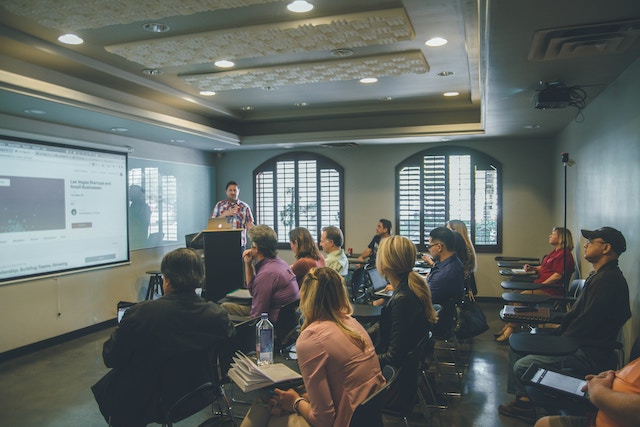Sexphobia 101: How our colleges and universities fail their students
I never thought that working in a prison with sex offenders would feel better than teaching at a college. Yet, after 16-years of teaching full-time, I have watched what little value higher education has had dwindled away. In the last few years, colleges and universities have focused so much on assessment and obtaining data-driven results, that they forgot that learning is a human endeavor that is starved for context. I write this after shuttering a program I developed on campus titled “Male Matters.” In 2019, the college administers still cannot handle a simple, basic discussion on human sexuality.
The purpose of the program was to see the world through the eyes of men in trouble. With the sex abuse scandals, the active shootings, and the high suicide rates we see with farmers in the mid-west, not to mention our military veterans, it felt an ideal time to bring such a program to campus. I was wrong. The program was met with hostility, a kind of passive, snarling aggression.
My program was not anti-feminist in any way, but the big taboo was it attempted to deal with male sexuality as well. According to psychiatrist James Gilligan, one of the major factors in many active shootings is about sexuality: the shooters were struggling with relationships. Gilligan has noted that the media often cuts out this factor because we live in a sex phobic culture.
We don’t want to talk about it. Yet, as a former intern for a statewide corrections sex offender program, a major factor in sex abuse and offending is that very silence. Here I was today being silenced by my college because they could not trust their professor of 11 years to give a presentation on kids, the notion of pedophilia, and YouTube.
They said people would trigger, that the topic is loaded, and I could not help to think that our society is loaded with extreme violence every moment and no one seems to notice. Why is that okay and not responsible for sexual discussion? Is being mugged any less traumatizing than a sexual assault? Is the guy that is on the registry for viewing child pornography more dangerous than the murderer that just moved next door to you? Murderers need not register. We are more than okay with a violent felon passing out candy on Halloween.
As a social worker and sexuality expert Melinda Gronen addressed in her workshop on Examining Child Sexuality, why do we not take seriously that the vast majority of child neglect and abuse, over 70%? Such draws nowhere near the same scrutiny as 7% of the child sex abuse cases that are reported? Only 2% of these child sex abuse cases are proven to have merit. Though these cases are likely higher than reported, what rings true is that physical violence and even killing is okay but sex crimes are in a different league altogether.
Considering those sex offenders have the lowest recidivism rate of any crime but murder, why the cultural panic? These are important issues we all need to consider. When colleges and universities refuse to address such sex phobia, they fail their students.
My point is not to minimize the impact of sexual abuse on kids. As an abuse survivor, I know the damage well, but we are moving into dangerous ground because our cultural phobia about sex, healthy and unhealthy, limits our study and understanding of human sexuality. Our focus only on survivors of abuse may make us feel better, but until we understand sexual offending and the connection that domestic abuse and even sexual abuse has had on the offender, such abuse will only continue.
On almost every college campus in the United States, not one class is required on human sexuality. Shouldn’t college campuses be the place to establish a safe space to talk and learn about sexuality? The major mistake that so many teachers and administrators make is that “uncomfortable” is an alarm to shut all conversation down. Students should be uncomfortable because there is a difference between feeling uncomfortable and being unsafe.
At nearly 50, I really feel uncomfortable when the doctor gives me a prostate exam, but I don’t feel unsafe. If I let my discomfort stop me, I may die of prostate cancer. If we allow schools to run away from difficult subject matter, then we fail our students. How can one think critically if they cannot handle the issue, or if we make issues so vanilla that we are not teaching any valuable skill sets? Such avoidance may leave young students in danger, not fully understanding consent, their feelings about their bodies, nor the insight that they may have been abused. Learning and discomfort, even pain, go hand in hand.
College education is not about paperwork, surveys and meaningless assessments that are often loaded with bias and errors. It’s about content, a safe space, and an often pain-in-the-butt teacher that challenges students and even administrators. From our doctor’s office to our psychologist’s office, from our daycare to our college campus, the loads of paperwork and assessments we are forced to do are not there to protect us, the student-patient-client. Such there to protect the agency from us.
Sadly, college campuses are moving in the same direction. Student success has more to do with the appearance of success than it does with actual student competency and readiness. I think I may just go back to that job in prison. At least there, we can talk about how the silence of sex does more to ruin lives than to protect them.
Editor’s Note: Check out Earl Yarington’s website silenceandsexuality.com
The opinions and analyses that Earl writes are his own and are not necessarily the positions or views of his employers, the agencies he supports, or that of his colleagues. Reach out with comments or questions.

